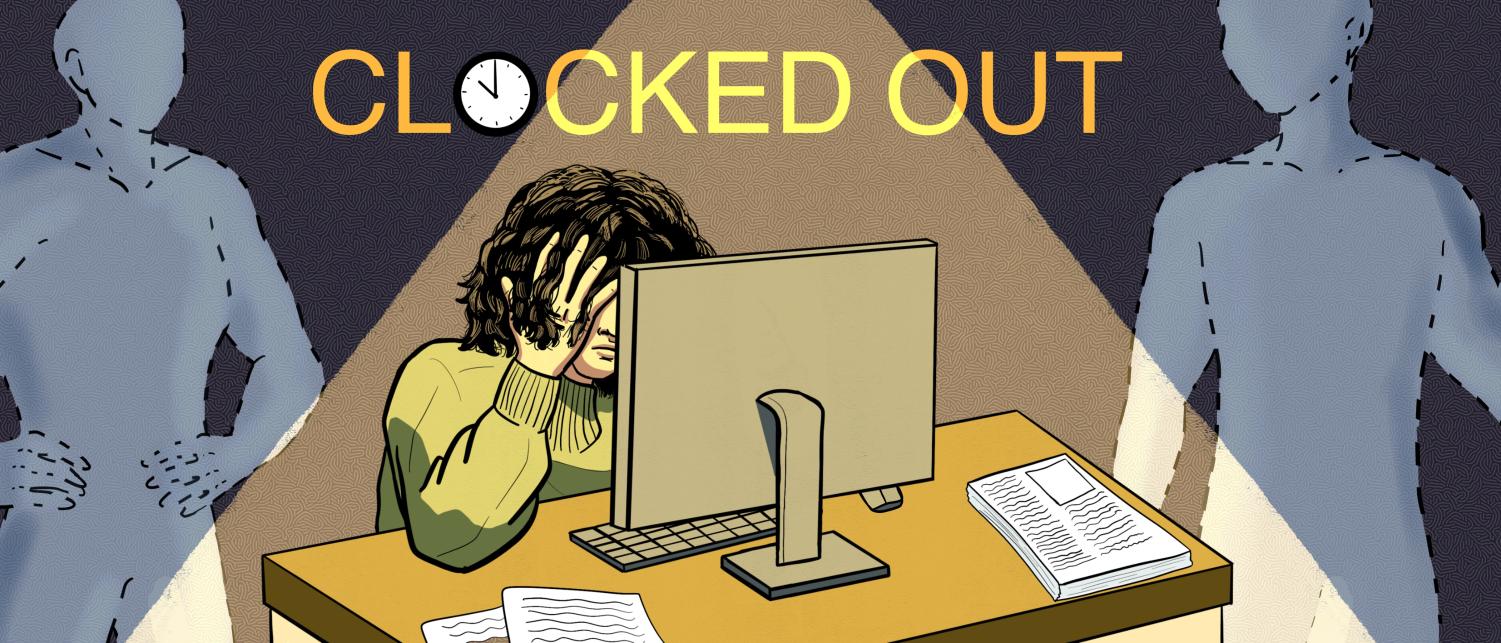In Focus: Multicultural Student Affairs office assistants report lack of support and action from professional staff
April 28, 2022
Content warning: This story contains mentions of threats of gun violence.
When SESP freshman Zoe Lewis arrived on campus last fall, she knew she did not want to work directly for Northwestern through her work-study. Coming to a compromise, she decided to apply for a job at Multicultural Student Affairs, a work environment she thought “should be better” because of its mission to support marginalized students.
However, Lewis said working at MSA did not meet her expectations. She said professional staff failed to listen to her concerns and took actions she believed were harmful to students. As a result, Lewis left her office assistant position in Winter Quarter.
“I signed up for this job because I thought it was supposed to be better — it has not turned out that way,” Lewis said. “Honestly, (the staff) made my life so much harder first quarter where it probably negatively impacted how I was existing and being.”
As office assistants, students working at MSA primarily staff the front desks at MSA’s three locations: the Black House, the Gender and Sexuality Resource Center and the Multicultural Center.
Lewis isn’t the only community member who’s had negative experiences with the office. Over the past academic year, multiple students have said they’ve felt unsupported and ignored by MSA professional staff members.
Weinberg freshman and former Daily reporter Alexis Schwartz said there’s “far too much responsibility” placed on office assistants.
Because MSA staff isn’t always around when office assistants work late-night shifts, student workers are sometimes left to independently address major issues, such as threat assessments and the relaying of student concerns.

“When you sit at the front desk, you have to bear the brunt of whatever decisions the professional staff makes, which is, in my opinion, incredibly unfair,” Schwartz said. “We signed up to nurture a multicultural space at Northwestern, to help this community to be a positive influence and create positive change.”
Scheduling struggles
MSA was founded in 2004 after years of suggestions from external consultants and the African American Student Affairs Strategic Planning Committee, according to MSA’s website.
The office assistant position is open to all students and hires many employees through the Work-Study Program. According to the application, responsibilities include opening and closing buildings, “general office duties as assigned” and other programming assistance.
While the 2021-22 office assistant application says the job requires eight to 12 hours per week and weekend availability, some students said MSA’s scheduling processes are disorganized. At the beginning of each quarter, students indicate preferred times and locations for shifts, though most students work in multiple buildings. When Schwartz filled out her preferences, she said she requested to be placed in the GSRC and MCC on morning shifts.
However, Schwartz said two of her three weekly shifts were scheduled in the Black House, and the staff placed her on consistent late-night shifts.
“(Working late shifts) was honestly taking a pretty significant toll on my mental and physical well-being, as well as my ability to perform academically,” Schwartz said.
Lewis said MSA staff members were “absolutely horrendous” with scheduling. As a biracial student, she said she also felt uncomfortable working at the front desk of the Black House without any anti-racism or sensitivity trainings.
Schwartz and Lewis said many office assistants raised this issue, and the students who frequent these spaces also brought these concerns to MSA staff.
According to MSA Director Alejandro Magaña, who took over the role in October 2021, staff can’t intentionally place students in certain spaces based on identities due to human resource laws regarding discrimination. However, Assistant Director Aaron Golding said MSA does consider how office students’ identities factor into their work experiences.
“We’re very mindful of how identity plays out, obviously, in the spaces that we oversee, so (we’re) thoughtful of that as well,” Golding said.
A Weinberg senior and former office assistant, who asked to stay anonymous for privacy reasons, said they didn’t understand why MSA staff asked for office assistants’ preferences if they weren’t going to honor them.
“(Office assistants) clearly chose the preferences so that people could go and be in communal spaces that they feel the most comfortable in,” they said. “(Staff) should’ve thought about what would be best for students and take student commentary into consideration.”
‘A Black student was banned from the Black House’
Schwartz and Lewis said a student approached them during one of their shifts in January to ask why they were working in a space meant for the Black community.
The student, a SESP fifth-year who asked to remain anonymous for privacy reasons, was an office assistant for over two years until they were fired in November 2021. According to the student, MSA said they were fired because their values did not align with the office’s.
Alleging that they stole a portrait of Barack Obama from the Black House and opening an investigation with the Office of Community Standards, MSA also banned the student from the space in January.
In the time they worked as an office assistant, the student said MSA transformed from an organization supporting Black autonomy to one collecting information about the students it serves — a change they attributed to new leadership.

Unlike this past academic year, they said their first two years at MSA were rewarding and enjoyable, and office assistants were close with the staff. But they said they feel priorities have shifted.
“What they want to do is surveil and not necessarily create a community where there’s accountability and trust,” they said. “MSA is just … disconnected from the Black community and is also engaging in anti-Black practices.”
After Schwartz and Lewis’ conversation with the SESP fifth-year, the pair brought the student’s concerns to the professional staff, hoping to find actionable solutions.
At the time, Schwartz said it seemed the staff took the issue seriously. But on Jan. 28, office assistants received an email from Austin Gardner, an administrative assistant at MSA, informing them the student had been “temporarily restricted” from entering the Black House.
“We recognize that there might be feelings around having to do this,” the email read. “We want you to know our goal is to reset boundaries and to support the wellness of OAs.”
The email said MSA expected office assistants to notify staff if the student entered the space rather than physically restricting their access, but office assistants still said they were uncomfortable with the situation.
“A Black student was banned from the Black House,” Schwartz said in apparent disbelief. “We were to help enforce a ban against a Black student being in the Black House.”
Schwartz said she sent a “pointed and long” email to the professional staff about MSA’s ban. She said multiple office assistants were prepared to quit within the week if the student did not receive a formal apology and reinstated access to the Black House.
As director, Magaña said he could not comment on why MSA decided to ban the student due to privacy reasons. Although their access to the Black House was reinstated in February, the student said they have not received an apology from MSA staff.
Upset by the lack of action, both Schwartz and Lewis quit their jobs at MSA by the end of the week.
“I don’t feel comfortable working in a place that bans someone from their own affinity space and also ignores students coming in to voice their concerns,” Lewis said. “If you say you’re there for a group of students, you should be.”
Other students were also angered by MSA’s actions. The anonymous Weinberg senior said receiving the email about the incident from Gardner was “a slap in the face.”

“Already, this campus is so white and so dedicated to preserving and upholding whiteness,” they said. “For them to prevent a Black student and a Black activist from entering one of the few Black spaces on campus is so violent.”
Complaints and confusion
Days after the anonymous SESP fifth-year approached Schwartz and Lewis in the Black House, both students said they received emails from the Office of Equity regarding the incident, asking if they wanted to file an official complaint against the student.
According to a Jan. 26 email obtained by The Daily, the letter said the office learned about “a concern involving identity-based conduct by another student.” Neither Schwartz nor Lewis reported the incident, and they said they were surprised by the email.
While Schwartz acknowledged the pair’s conversation with the anonymous student was “rather intense,” she said she never felt threatened or targeted. Both students said they still don’t know who notified the office, but have expressed frustration over the fact that the office was notified on their behalf without their knowledge.
“Now that’s something that Northwestern has my name attached to with zero consent or conversation at all,” Schwartz said.
Magaña said he could not comment on the matter because issues involving the Office of Equity are personal and confidential.
The email from the Office of Equity suggested next steps for both students to take, including meeting with the office to file an official complaint. However, Schwartz and Lewis said they ignored the communication.
“No one ever asked us if they could refer our name to the (Office of Equity) or anything like that,” Lewis said. “It wasn’t a conversation before or after that was mentioned to us.”
On April 21, the anonymous SESP fifth-year also received an email from the Office of Equity detailing allegations filed against them for “race-based harassment.” The student said they did not know who notified the office or why they received the email two months after their previous investigation was closed.
The email outlined patterns of conduct in the allegation, including calling student employees at the Black House to ask about their race and advocating for non-Black employees to be fired. The student said they did not discriminate based on race when asking questions and did not advocate for anyone to be fired.
Reporting a gun threat
On Feb. 22, a student notified an office assistant of a threat written on a whiteboard at the Multicultural Center. The message read, “I am insane, also I have a gun.”
As one of the office assistants working that evening, Communication sophomore Aleah Vega said she tried to contact her supervisors to determine what protocol to follow. She said her supervisors were not immediately available, as the incident occurred at about 7 p.m., hours after they went home for the day.
Left to assess the situation and take action without extensive safety preparations, Vega said she and her coworkers decided to check the whole building to make sure no one was hiding with a gun, eventually calling University Police. After UP arrived 20 minutes later, Vega said the officers performed the same inspection and then deferred to the students for potential next steps.
Vega eventually locked up the MCC, and her coworker closed the Black House as well. All MSA spaces remained closed for days following the incident.
“Northwestern pushes so hard for police presence, and the one time police presence would have been kind of clutch, they didn’t really do anything,” Vega said. “It was just taken so nonchalantly. It was just really bizarre … Why does no one know what to do right now?”
Vega said she could only get in touch with the professional staff after the situation was diffused. While her supervisor invited her to follow up with staff, she said she was not comfortable returning to the building — or her job.
What stuck with Vega the most, she said, was how casually she felt the staff handled the situation, even though it was serious to the students present that night.
“It’s almost like it never happened,” Vega said. “What happened was definitely the University’s fault and MSA’s fault, and then it was kind of skipped over, and the next week, it was like it didn’t even happen.”
Magaña said the office assistants did what the staff would’ve wanted them to do by alerting UP, contacting staff and closing the space.
Since the incident, Magaña said the staff has been working to change its protocols so office assistants are prepared in the future.
“We’ve looked at additional measures across our spaces and in collaboration with folks in different offices around what additional safety measures and protocols can be put in place,” Magaña said. “We’ve installed panic buttons in the space. We’ve activated the administrator on call to be a resource for students — especially in the evenings — to have a first point of contact.”
University spokesperson Hilary Hurd Anyaso said the University takes threats and acts of intimidation seriously but was unable to find a suspect.
“Unfortunately, the investigation did not identify any individual(s) who may be responsible for the writing on the MCC whiteboard, and due to the lack of actionable information, the investigation has been closed,” she said in an email to The Daily.
Vega said she does not plan on returning to her job at MSA, and her only point of staff contact since the incident has been Golding. Although she was told to go to Counseling and Psychological Services, she said she felt isolated by a lack of institutional support because “CAPS ain’t shit.”

“It’s just very ironic that the multicultural spaces, the jobs that are supposed to be for multicultural students, (are) so unsafe and so unregulated and unorganized,” Vega said. “It just feels very weird, intentional.”
Pay delays and training troubles
These workplace issues aren’t the only problems MSA office assistants face. In the fall, multiple student employees said they experienced delays in work compensation. The anonymous Weinberg senior said their first paycheck was more than a month late, even though they were supposed to be paid on a biweekly basis.
They said the compensation delay was worrying, especially for students who rely on their paychecks to cover bills and other costs.
Lewis said she and other office assistants also experienced payment delays, and her first paycheck was for $13 per hour instead of the advertised $13.60 per hour. She said navigating these issues outside of work took an additional toll.
“When I left work, I was trying to be done because that wasn’t a possibility most of the time,” Lewis said. “It was so much emotional stress outside of work.”
The payment problem was eventually resolved, Lewis said, but she still felt like she was working unpaid for the majority of Fall Quarter 2021 because her check did not arrive until just before Thanksgiving.
According to Magaña and Golding, the return to in-person operations during the 2021-22 academic year caused Universitywide delays in processing payments. Magaña said the backlog in human resources caused delays and errors in paperwork processing.
“As we become aware of those situations, we work on the back end to remedy those as quickly as we can with HR to make sure that everyone gets compensated for their work,” Magaña said.
Months have passed since the anonymous SESP fifth-year first brought up concerns regarding non-Black students working in the Black House, especially without training. But Weinberg sophomore and current office assistant Nélianne Warner said MSA still has not initiated any meetings or trainings for office assistants.
Warner said she has had a “fairly neutral” experience working at MSA, but the staff has not prepared office assistants to address situations involving cultural differences.
“It’s disappointing to keep seeing things happening for minority students and in minority student spaces and then never really getting fully resolved,” Warner said.
Golding said the lack of training is a symptom of reopening MSA spaces after almost two years of virtual services.

The staff has coordinated meetings with office assistants to discuss the legacy and importance of the Black House, Golding said. Still, Warner said MSA has not equipped non-Black students with the tools needed to work in a Black space.
“One thing that we are navigating is a scaling up of our procedures, our operations, in a big way,” Golding said. “Making sure that we are able to get everyone in the same space at the same time has been a challenge that we’re figuring out as we go along.”
Lewis said she wishes the staff would have given office assistants proper training, but she still believes MSA should hire more Black students to work in the Black House.
At one point, Lewis said MSA staff told her not enough Black students applied for the role. But she also said she knew multiple Black students who were rejected by MSA.
“I’m not sure how that adds up at all,” Lewis said. “It’s an office assistant position, you’re sitting at a desk — literally anyone at Northwestern could’ve gotten that job.”
A need for broader change
These issues aren’t exclusive to NU. At Harvard University, students have been advocating for a physical space dedicated to serving students from marginalized backgrounds for almost half a century, according to The Harvard Crimson.
According to the article, past Harvard administrators have countered these calls by arguing that a separate space would cause racial separation. However, the article states that the current administration is listening to student perspectives as it considers creating a multicultural center.
At the University of Michigan, a Black graduate student sent a letter to administration frustrated that white organizations were reserving spaces at the school’s Multicultural Center, “kicking Black and brown students out,” according to The Michigan Daily.
A month later, a white student responded to the letter by claiming it was racist toward white people in an article published in The Michigan Review, sparking controversy.
While NU’s MSA issues are specific to the University, students’ demands across different universities echo similar concerns about the institutional treatment of marginalized students in affinity spaces. For the office assistants who left their jobs at MSA last quarter, their demands are clear.
Lewis said she wants the professional staff to acknowledge its wrongdoings and apologize for its actions. Schwartz said she thinks there needs to be a better system in place so there isn’t as much responsibility and burden placed on office assistants, especially after 5 p.m.
The anonymous Weinberg senior emphasized that office assistants are just students, whether they are trying to pay their bills, manage a crisis or navigate bans on other students.
“The whole point (of MSA) is to support students with the means that you have, financially and spatially, and so if they’re not even doing that … then why have the MSA?” they said.
Lewis said she won’t return to an NU work-study job because of her MSA experience. She now works in Evanston because she no longer believes there are any “good subsections of Northwestern work.”
Like Schwartz and Lewis, Vega said she approached the role expecting a completely different experience than the one she had.
“I went into the job thinking that it was a safe space, but now I just completely feel like they’re on the regular Northwestern agenda,” Vega said. “I would criticize them for claiming to be a space that’s safe for students of color to work, but using that as a mask to just be like any other place in the school.”
Email: [email protected]
Twitter: @laya_neel

